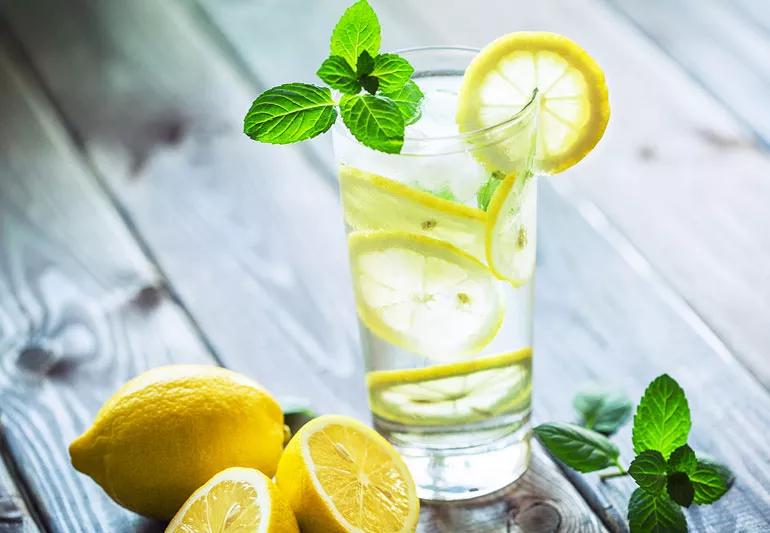An expert explains a complicated relationship

Image content: This image is available to view online.
View image online (https://assets.clevelandclinic.org/transform/a76c8214-36ca-4477-97d3-a6717f61b455/kidneyStonesCitricAcid-466723416-770x553-1_jpg)
lemon water or lemonade helps stave off kidney stones
If you’ve ever had a kidney stone, you probably remember quite well the discomfort that the condition brings. And if you’ve never had one, you’ve probably heard enough about them to know you want no part of it.
Advertisement
Cleveland Clinic is a non-profit academic medical center. Advertising on our site helps support our mission. We do not endorse non-Cleveland Clinic products or services. Policy
But it’s important to know what conditions you may have that can cause stones to form because some, like gastrointestinal issues, aren’t ones you immediately think of when you think about kidney stones.
Yes, things from diarrhea to even specific diets can lead to the development of kidney stones, painful consequences of what’s happening in your gut. We spoke with urologist Smita De, MD, PhD, about those links and what you can do to protect yourself against developing stones.
As unpleasant as diarrhea is, it can become even more unpleasant in causing kidney stones thanks, mostly, to dehydration. “Depending on what kind of diarrhea and why you have diarrhea, it may lead to kidney stones,” says Dr. De.
Generally, this is a problem if the process goes on for a long period of time, such as with a case of chronic diarrhea. It’s unlikely, though, that stones would happen from a short bout of diarrhea like from food poisoning, says Dr. De.
Patients who have had gastric bypass surgery and gastrointestinal disorders such as Crohn’s Disease can also be prone to kidney stones and it has to do with calcium and oxalate, says Dr. De.
While calcium oxalate is the most common kind of kidney stone and can form as a result of a number of issues — like when you’re not drinking enough fluids — Crohn’s patients and gastric bypass recipients are at an increased risk of these stones partially because of absorption issues.
Advertisement
These patients don’t absorb fats as well and those fats bind with calcium in the intestine. Normally, calcium binds with a molecule called oxalate but, says Dr. De, because that calcium is now bound by those fats, there’s more free-floating oxalate in the intestine.
That oxalate then gets absorbed in the GI tract and excreted into the urine. As levels of oxalate increase in the patient’s urine, in addition to other changes in the urine composition, those oxalate molecules can bind to calcium in the urine, forming kidney stones.
“These patients struggle mightily,” Dr. De says, “and it’s unfortunate because many gastric bypass patients don’t know about that increased risk. So they try to do something good for themselves but end up with this other problem.”
What you put in your gut can also have an effect on developing kidney stones. Patients with kidney stones should discuss specific dietary recommendations with their healthcare provider. They may need to complete a special urine test that identifies modifiable risk factors, including decreasing salt intake.
Additionally, let your healthcare provider know if you take any supplements as many common ones, such as vitamin C, can increase your risk of developing stones.
While they’ve been trendy for a few years now, high protein diets could also put you at a higher risk for kidney stones. For example, the keto diet is heavy on meat which means you’re taking in way more animal proteins.
“That high protein causes a buildup of uric acid in the urine,” Dr. De says. That higher acid level can, in turn, lead to kidney stones. Dr. De recommends a diet that limits daily animal protein intake and uses standard portions of meat with a portion being about the same size as a deck of playing cards.
While there are these risks, Dr. De says there are ways to increase kidney stone prevention.
Advertisement

Sign up for our Health Essentials emails for expert guidance on nutrition, fitness, sleep, skin care and more.
Learn more about our editorial process.
Advertisement
The inability to burp can cause farting, stomach pain and nausea
Your gut never really stops working — and that’s not even the most incredible thing about it
A healthy gut benefits your entire digestive system — and more
No, it doesn’t stay in your stomach for seven years
Here’s why prebiotics matter
Breaking down digestion speed
The caffeine and natural acids in coffee may trigger acid reflux, but there are ways to lessen the effects
Wait a few hours, then start with water or ice chips, graduating to clear liquids and then, soft, bland foods
Prioritize your health by managing stress, strengthening your social connections and getting quality sleep
Bolsters, blankets, pillows and blocks can offer extra support, stability and comfort
Allergies, postnasal drip, asthma or reflux could be to blame for a cough that won’t quit